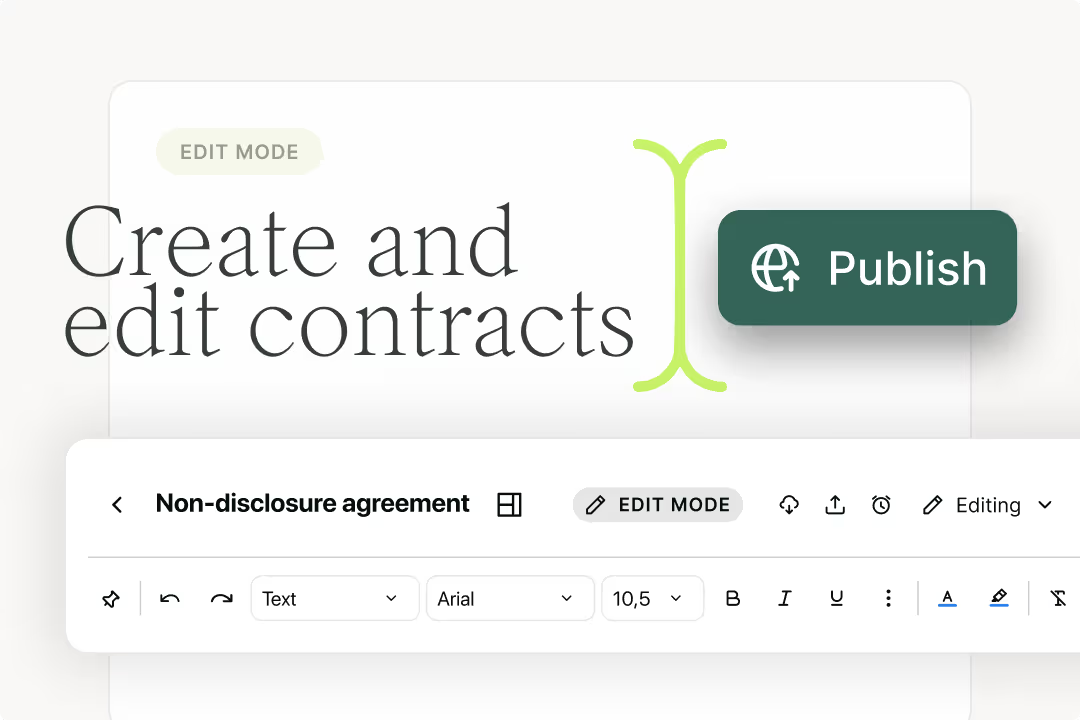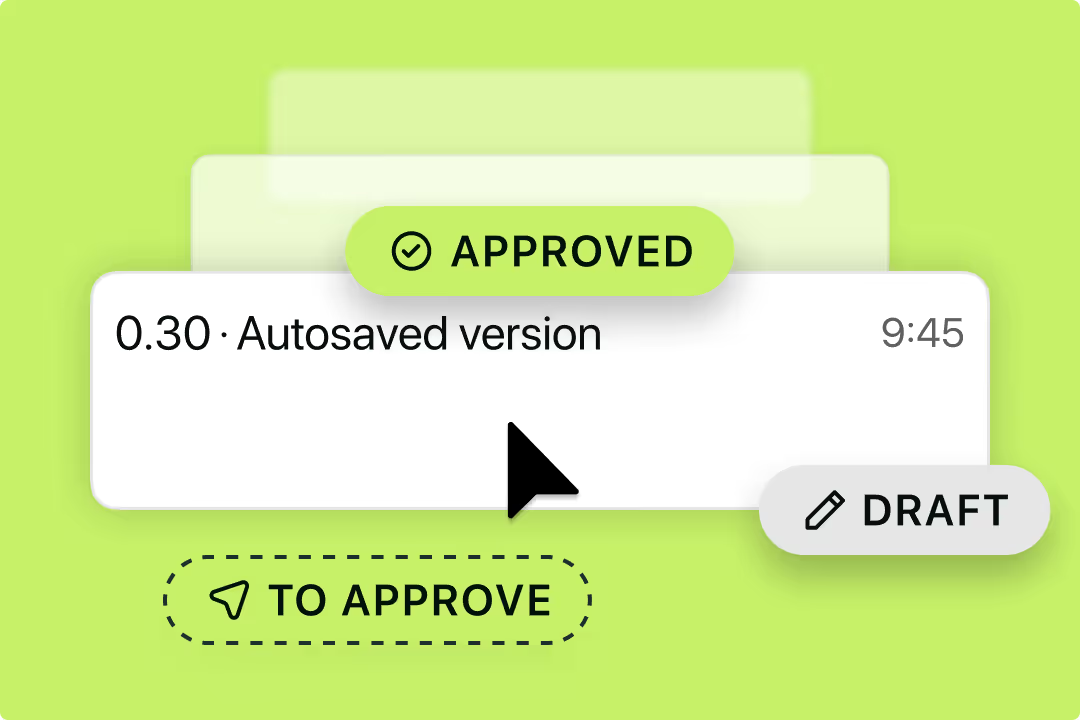Solutions
Customer Support
Resources
The traditional way of handling contracts requires a huge amount of manual work, which is time-consuming and creates friction for the modern business.
Online contracting departs from this outdated norm, empowering legal and business teams to speed up the contract processes and relieve themselves from hours of dull admin work.
Why is this important? Well, lawyers have told us they're feeling the squeeze, with our recent report finding that 52 per cent of respondents feel buried in low value work, and 58 per cent feel the pain of limited budget and resource.
More alarmingly, almost half of in-house lawyers have experienced burnout. And many still are. Something has to give.
An online contract is a legal agreement that's been created, agreed and signed electronically, and is accessible on the internet via browser-based software like Juro.
Unlike traditional contracts which involve paper and a wet ink signature, online contracts can be executed using a variety of devices and signed electronically, making them a convenient option for scaling businesses.
With the right contract management system, you can create online contracts from within your browser in a matter of seconds, automating the process with pre-defined templates and worfklows.

Best of all, your contracts are built as structured data when you use a tool like Juro, so you can identify, track, and analyse critical information in your legal documents quickly.
That's right. No more reading contracts line-by-line to extract key contract data. It's at your fingertips, ready when you need it.
The same platform enables lawyers and business colleagues to quickly create, negotiate, review, edit, approve, eSign your company’s contracts in one workspace.
If you're ready to take your first steps in moving your contract workflow online, hit the button below to see Juro's browser-based contract management solution in action. If you're just here to learn, read on.

Digital contracting sounds great if you have a blank slate to work from - but often, legal departments need to digitize contracts that already exist as PDF, Word, or Google documents.
Fully digitizing your existing contracts structures their data to enable powerful search, automation, and data analytics capabilities.
It’s no wonder that, according to a recent EY 2021 Law Survey, digitization ranked as the number one priority among CEOs planning changes to their business model, with 61 per cent of CEOs expecting to make significant investments into data and technology.
Contracting should be no different.
Here are three ways upload and digitize your existing contracts in seconds using Juro:
Word has been the default environment to create contracts for decades - and there are still upsides to creating contracts in Word.
But for modern businesses with contract volumes that are high and increasing, the friction and bottlenecks caused by using a word processor to manage digital, revenue-facing documents can be severe.
Using Juro’s in-browser editor to draft online contracts offers significant benefits.
Every online contract and contract template you create, and every contract created from the templates, is born digitally. Its data is structured, enabling full search, automation, and data analytical capabilities from minute one.

So how do you do it?
Self-service contracts help avoid the often extensive delays and hassles that arise with the need to consult the legal team for every agreement and revision.
Templates are easy to maintain and update self-serve in the platform - unlike Juro’s competitors - helping to ensure new contracts don’t need modifications and consistently contain the most up-to-date, risk-adjusted language.
When edits are required, Juro’s contract drafting tool makes secure online collaboration the most efficient option.
If you need input from a colleague on a contract created in Juro, the easiest way to get it is to at-mention them by typing the @ symbol before their name and selecting their name from the menu that appears or continuing to type out their full name.
Colleagues can then make revisions in the same document using the same in-browser editor. They can also offer suggestions and can link a comment to a specific contract clause for even greater clarity.
When you’re ready for contract review to get the document approved, don’t waste time downloading files and pinging them around email and Slack.
With Juro, you instead build automated approval workflows for fast, easy, and easily trackable approvals.

Simply hit a button to send contracts and route the contract as directed, alerting the defined contract approver and making sure you stay ahead of the game, spotting delays before they happen.
Contract negotiation can be a painful part of the lifecycle - but the good news is that you can manage this entirely in-browser too, with a clear process that helps negotiators focus on identifying and handling issues and closing deals quickly.
In-browser negotiation uses redlining features designed specifically for online contracts, eliminating time-consuming – and potentially costly – version control issues.
Negotiators can hide internal comments from outside parties and control which edits and comments counterparties see. Parties mark up a single document, and the software aggregates comments and emails them to counterparties when appropriate.
Meanwhile, the platform also tracks every revision in an easily accessible and secure digital audit trail. Your legal team can learn from each negotiation and determine how to optimize the language in your templates.
If you want to travel back in time and see how the elements of the contract changed throughout, just hit the timeline and click back through different versions.
Contract signing is the area of the workflow that's been most comprehensively addressed by new technology, thanks to numerous eSignature platforms.
But most contract platforms require parties to move to DocuSign, HelloSign, Adobe Sign, or other applications to complete eSignature. For this reason it can be time-consuming to stitch together several different processes manually, just to get to electronic signature.
Instead, Juro offers a native eSignature tool that allows parties to continue working in the same secure browser-based contract platform through contract signing and into post-signature management.
.avif)
Simply drop signature blocks into contracts at the appropriate locations, then hit a button to share it with signatories. You’re able to:
Juro’s mobile-responsive platform enables secure contract signing on any device. The process is intuitive, with just one or two easy clicks. The signature becomes a digital artefact with a timestamp to memorialize the agreement.
The platform stores the digital signature in the cloud, where high-level security measures protect it from loss, theft, and improper access.
Contracts create binding obligations that need to be managed well after signature - which is why Juro’s browser-based contract automation platform offers post-signature features too, including:
Online contract automation platforms like Juro capture critical data regarding commercial terms, obligations, and liabilities at the point of assembly.
Other captured data points collected throughout the contract lifecycle include touch times, frequently negotiated terms, approval rates, cycle times, and more.
Using Word of PDFs to manage contracts, conversely, means no structured data - documents are hard to search, negotiation data is lost, and it’s difficult to find out what obligations and dates need to be tracked.
This is why businesses end up spending thousands on AI contract review to find out what’s in their own contracts.
When creating online contracts in Juro, all contract data is structured. This means that:
Juro’s AI-native contract automation platform empowers legal and other business teams to accelerate the creation, execution and management of contracts.
This unlocks:
If you're interested in joining the 6,000+ customers already streamlining their online contract workflows, fill in the form below to book a personalized demo.
Lorem ipsum dolor sit amet, consectetur adipiscing elit. Suspendisse varius enim in eros elementum tristique. Duis cursus, mi quis viverra ornare, eros dolor interdum nulla, ut commodo diam libero vitae erat. Aenean faucibus nibh et justo cursus id rutrum lorem imperdiet. Nunc ut sem vitae risus tristique posuere.

